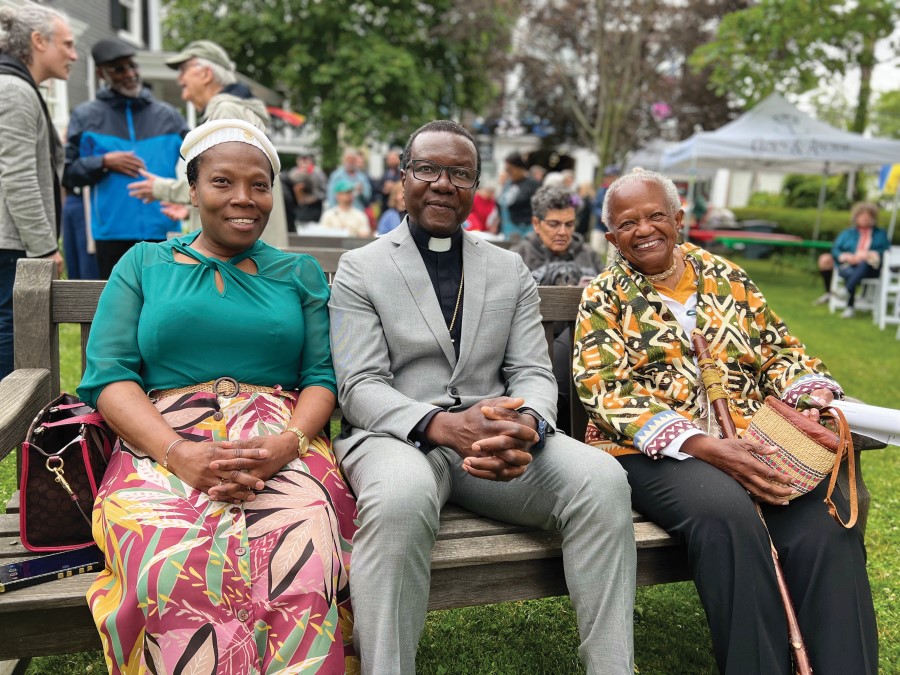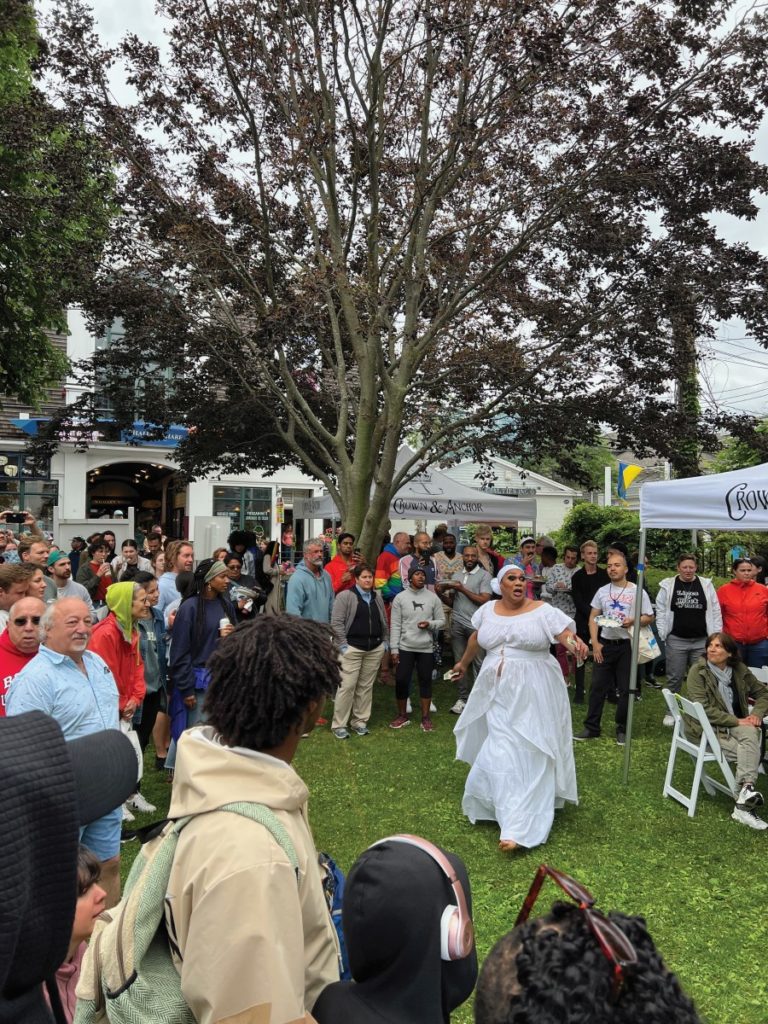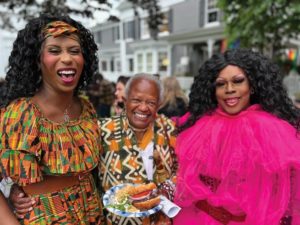PROVINCETOWN — “If we can’t undo the mistakes of the past, then we have a responsibility to acknowledge those mistakes,” said Ngina Lythcott of Provincetown, speaking to a crowd of about 60 on the front lawn of the Unitarian Universalist Meeting House on Sunday at the town’s second annual celebration of Juneteenth.

The new federal holiday commemorates the liberation of enslaved people in Texas in 1865, almost two and a half years after President Lincoln issued the Emancipation Proclamation.
This year’s event started with speeches from community leaders reflecting on the century and a half between emancipation and today. Then it evolved into a barbecue and a show featuring Black drag queens and poetry recitations by Provincetown fifth-graders.
“We solicited lots of feedback,” said Trevor Pittinger, one of the volunteer organizers. “Folks wanted more of a block party.” Pittinger, associate director of the Provincetown Business Guild, said he saw this year’s event less as presentation and more as an embodiment of the town itself.
The stream of pedestrian chatter and the music of an accordion played by a nearby busker accompanied the day’s proceedings and, eventually, so did curious passers-by as they perambulated down Commercial Street.
Pastor David Brown of the Chapel on the Pond in Truro opened the celebration with a prayer. Lythcott offered an indigenous people’s land acknowledgement and reminded the crowd that the Wampanoag have asked that the name “Race Point Beach” be changed to “Meeshaun Point.”

Pastor Brown’s wife, Carlene Brown, sang the hymn “Too Much to Gain to Lose,” the refrain of which is: “Defeat is one word I do not use.”
One after another, speakers called upon the audience to speak out about discrimination and injustice and to add their voices to community discussions and decisions.
“Speaking to a rainbow of people of color,” said Walker, “I want us to think about moments we were silenced.” Walker asked people to examine those moments and think about how they can be heard in the future. She concluded her speech by urging community members of color to “truly consider joining committees and boards.”
Aaron Clayton, an organizer of the event, addressed white members of the crowd. “As a white person speaking to white people, I think we have something else to think about here,” he said. Two years elapsed between 1863, when the Emancipation Proclamation was issued, and 1865, when Union soldiers marched into the Confederate stronghold of Texas, he said. Even then, many enslavers withheld information about emancipation from the enslaved until after the 1865 harvest was over.
“How many white people in Texas knew about emancipation and said nothing?” Clayton asked. “It’s a stark example of how silence equals violence, and complacency equals complicity. We must look at ourselves and ask if we now are also being silent.”
Walker’s and Clayton’s speeches, delivered on a stage with a microphone, echoed down Commercial Street. “We didn’t want the ceremony to be hidden in any way,” Clayton said about bringing the event downtown. “We wanted everything said to be amplified through the streets where you have to hear it.”
Walker spoke of the event as part of “a new era” in Provincetown. She told the Independent that, in the future, there should be celebrations of our many heritages. “It’s not just about Pride,” she said. “There are other ways we can celebrate our diversity.” She said she was all for the addition of a cookout to the proceedings, something “as American as apple pie.”

There were songs by Black artists Stevie Wonder and Al Green and, more than once, Beyoncé’s 2016 song “Freedom,” which became a protest anthem for the demonstrations after the police murder of George Floyd.
There were hometown artists, too. “We speak our truths through performance in this town,” Clayton said. “This is a town that is held together by art.”
Qya Cristál, a local drag queen, emceed the show and sang two songs, the gospel hymn “His Eye Is on the Sparrow” and “I Know Where I’ve Been” from Hairspray. In the musical, it’s sung during a scene depicting a civil rights march through Baltimore.
Lakia Mondale reimagined Harriet Tubman on the Underground Railroad to the song “Stand Up.”
“I’m gonna stand up/ Take my people with me/ Together, we are going/ To a brand-new home,” the song declares.
Provincetown fifth-grader Salina Bedford read an original poem, “My Black Queen,” and three other Provincetown students, Shakira Booker, Caroline Brown, and Krista Burke recited Angela Johnson’s Juneteenth poem “All Different Now.”
Writer Ephen Glenn read a passage from the late Toni Morrison’s Beloved. In the passage, Baby Suggs, a freed Black woman in Cincinnati, “situates herself in a huge, flat-sided rock” in a clearing in the woods. “Every black man, woman, and child who could make it” comes to hear Suggs’s sermon, which takes place not in a church but outdoors. The sermon is one not about God and the great beyond but about flesh and the deep down.
“ ‘Here, in this here place, we flesh,’ ” Glenn read. “ ‘Flesh that weeps, laughs; flesh that dances on bare feet in the grass. Love it. Love it hard. Yonder they do not love your flesh. They despise it … You got to love it, you!’ ”
Glenn concluded the reading by saying that, out here in the open in Provincetown, something similar was beginning to take shape.



